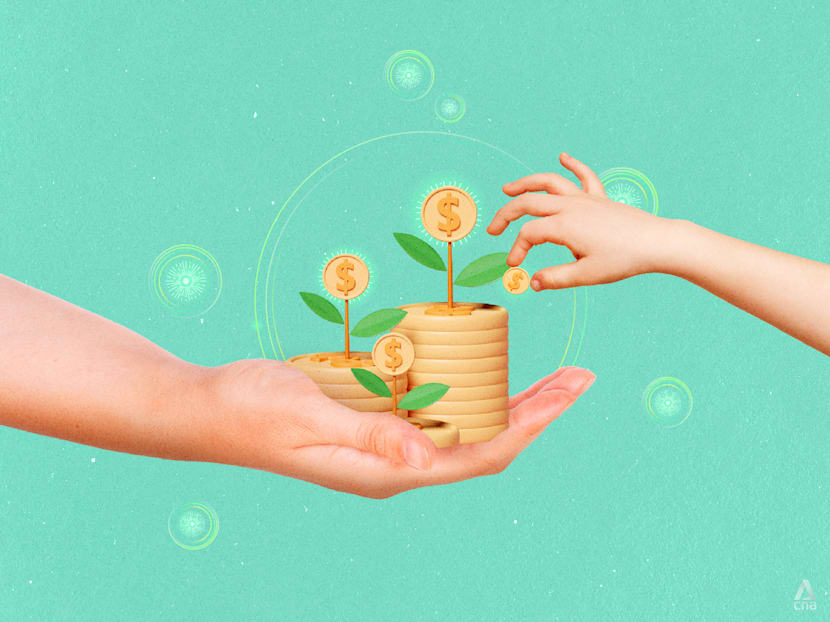Growing up, I felt guilty talking about money. Here's why I'm changing that for my kids
As a child, Mr Daniel Sim felt like he did not have opportunities to talk or learn about money. He explains why he believes in doing it differently with his own children.

Mr Daniel Sim believes it's not enough to simply teach his kids to save money. He shares how he's equipping them with a deeper understanding of it. (Illustration: CNA/Samuel Woo, iStock)

This audio is generated by an AI tool.
At the time of drafting this piece, the TOTO prize pool has reached S$10 million this year for the ninth time.
Just a few months ago, I recalled a dinner conversation with my children to help them make sense of the lottery prize pool. I offered them two choices: Pick a million dollars right now (from, say, striking the lottery) or choose one cent that doubles every day for the next 30 days.
Unsurprisingly, one of them picked the first option and the second choice was selected by another. It was only after we brought out the calculators to do some sums that they realised that the one cent would eventually compound into an amount that exceeds S$10 million.
This little exercise is one of the many ways I try to help my children build a stronger understanding and discernment towards how money works – how it can be grown, used and saved.
WHY WE NEED TO TEACH CHILDREN WHAT "MONEY" IS
One of the things parents like me often worry about is whether we are setting our kids up for future success or failure.
We get them into good schools. We teach them the values we believe will serve them best. We spend our hard-earned money on them, but we also worry about whether we're truly helping them to understand the value of money.
With three kids below the age of 12, I understand this anxiety all too well. Which parent would want their child to be held back from their dreams due to financial insecurity?
Growing up, my family never really had the luxury of building savings.
My father was a taxi driver, and I saw how hard he worked every single day, even when he was sick, just to cover vehicle rental and petrol costs. Every cent was spent deliberately to keep the lights on and the water running at home.
At the same time, I grew up hearing things such as "filthy rich" or "money is the root of all evil". While I wanted to relieve my parents of the need to trade their time and health for money, these negative connotations also made me feel guilty about wanting to have more money or learn more about money.
After I secured a scholarship at university, one of the first things I did with the extra cash was to alleviate my parents' financial burden.
I could tell that my parents felt bad about this, that I felt like I had to "support" the family when I was supposed to be focusing on my education. However, at the time, it felt like the right thing for me to do.
It is precisely this experience that has shaped me into a parent who does not believe in simply teaching my kids to save money, but equipping them with a deeper understanding of it.
USING MONEY WITH PURPOSE
Our kids are still in primary school, so it's too soon to be teaching them about investing. But establishing a foundational understanding of how money compounds through simple mathematics can set the stage early.
A simple way we do it: A Central Provident Fund (CPF) Special Account was created for each of our children from their birth, and we have been steadily depositing their hong bao money (monetary gifts in red packets exchanged during Chinese New Year) into this account every year.
It sounds trivial – could a few hundred dollars a year really make that much of a difference? But just like the example I gave them about one cent compounding every day, imagine letting the money compound from their birth to when they are 65. They would most certainly be CPF millionaires.
My wife and I also make sure to teach our kids that money isn't just for growing personal wealth to be hoarded, but a resource for doing good.
As part of our regular budgeting plans, we consistently set aside a sum for causes we're passionate about, such as the Milk and Diapers Programme for babies in low-income families in Singapore.
As a family, we also take part in distributing food to the less fortunate as a way of getting the children exposed to a slice of society in need, people they may not always encounter or be aware of in their day-to-day living.
Through this, we demonstrate the importance of budgeting and setting aside money to use for ourselves and others, while finding that sweet spot still to enjoy little treats along the way.
After all, budgeting does not mean saying "no" to everything. The kids still see Daddy using his old iPhone from a few years ago instead of snapping up new Apple releases every year. They also see him buying his S$7 coffee, when he could be keeping it all in a high-yield savings account.
The way we see it, it's not about "optimising" every dollar or saving it all for ourselves. It's about using money in ways that reflect and serve our priorities, which may differ from family to family.
For instance, a priority for us is to create precious family memories, especially while the children are still young. Therefore, the value of a family holiday to us is much more than the monetary amount spent on flights, hotels and so on.
UNDERSTANDING OPPORTUNITY COSTS
Helping my children understand how to manage money is not just about teaching them to obtain or multiply it.
Teaching them how to budget and save wisely will require them to understand opportunity costs. And at their age, this is perhaps the most important lesson to instil in them.
Sometimes, my kids return home from school talking excitedly about their classmates' new toy or latest holiday.
As parents, we can't run away from these situations as they happen. As our children grow older and interact with peers from all walks of life, they are only going to get more exposed to new ways to spend money – be they on new toys, new phones or new activities to do with their friends.
Last December, my primary school-going children asked me why we were not going for a family holiday during the year-end break. All their friends seemed to be travelling somewhere with their parents – Japan, Thailand, or across the Causeway to Malaysia.
I was glad for the opportunity to explain to them that saying "no" to an overseas trip that December meant saying "yes" to a longer trip to Australia next June instead.
We were able to share our thoughts with each other on why we felt it was a worthy trade-off, and how we could focus on making the most of our break in Singapore.
We also agreed to be more intentional about enjoying each other's company for our "holiday in Singapore".
Eventually, my children will grow to make their own financial decisions and definitions, based on what money itself is worth to them. Is it worth a new car or an exotic holiday? Is it worth helping others via a charity or a cause?
Hopefully, by then, they will understand that money's true value is in building their own legacy of generosity towards others and self, rather than simply wishing to strike a million dollars from a TOTO draw.
Daniel Sim is a father of three and the founder of a financial education company.












